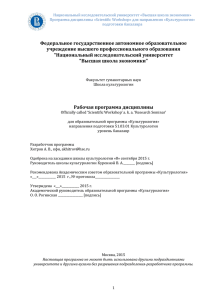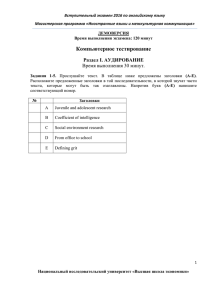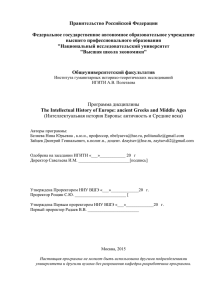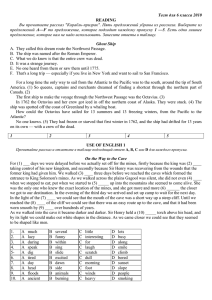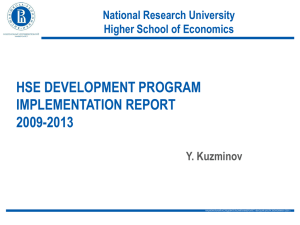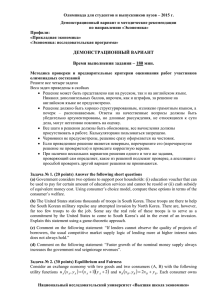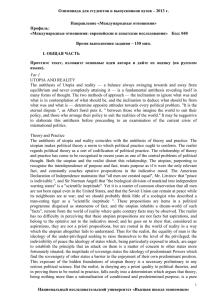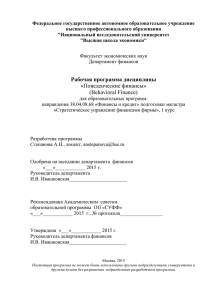Contemporary Programs in Cultural Studies
реклама
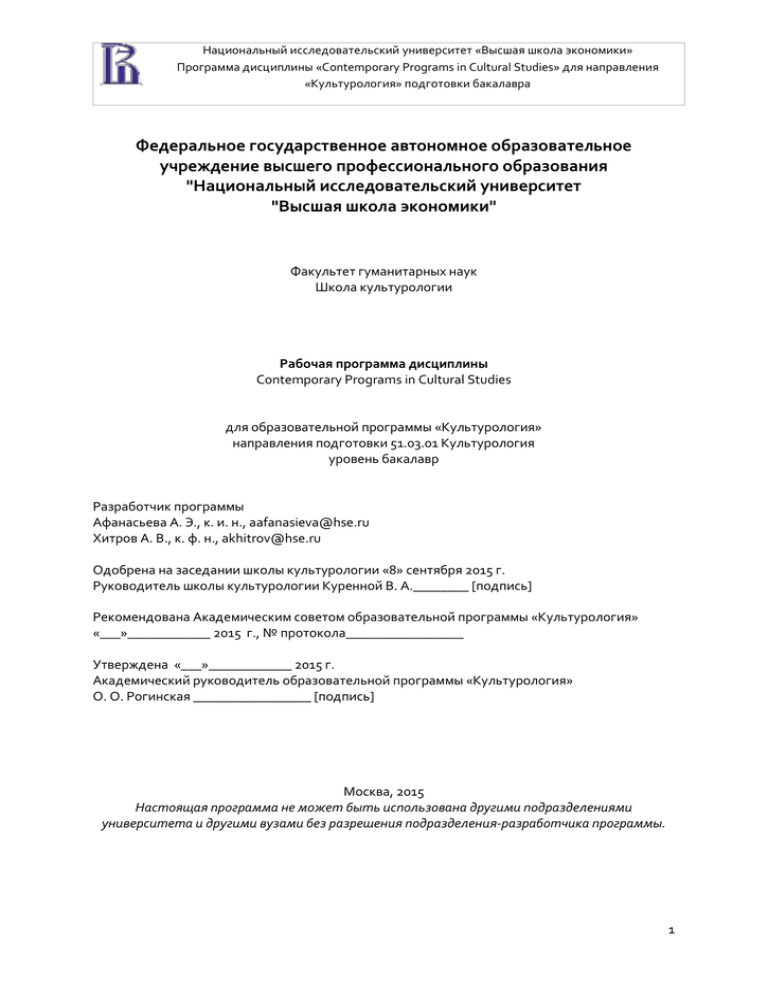
Национальный исследовательский университет «Высшая школа экономики» Программа дисциплины «Contemporary Programs in Cultural Studies» для направления «Культурология» подготовки бакалавра Федеральное государственное автономное образовательное учреждение высшего профессионального образования "Национальный исследовательский университет "Высшая школа экономики" Факультет гуманитарных наук Школа культурологии Рабочая программа дисциплины Contemporary Programs in Cultural Studies для образовательной программы «Культурология» направления подготовки 51.03.01 Культурология уровень бакалавр Разработчик программы Афанасьева А. Э., к. и. н., [email protected] Хитров А. В., к. ф. н., [email protected] Одобрена на заседании школы культурологии «8» сентября 2015 г. Руководитель школы культурологии Куренной В. А.________ [подпись] Рекомендована Академическим советом образовательной программы «Культурология» «___»____________ 2015 г., № протокола_________________ Утверждена «___»____________ 2015 г. Академический руководитель образовательной программы «Культурология» О. О. Рогинская _________________ [подпись] Москва, 2015 Настоящая программа не может быть использована другими подразделениями университета и другими вузами без разрешения подразделения-разработчика программы. 1 Национальный исследовательский университет «Высшая школа экономики» Программа дисциплины «Contemporary Programs in Cultural Studies» для направления «Культурология» подготовки бакалавра На формирование каких компетенций нацелена программа учебной дисциплины на английском языке В результате изучения курса «Современные программы исследования культуры» студент должен обладать следующими общими (универсальными) компетенциями: Знания Знать: основные социально-значимые проблемы и процессы. Умения Уметь: использовать основные положения и методы гуманитарных, социальных и экономических наук в различных видах профессиональной и социальной деятельности. Навыки Обладать навыками: работы с теоретической и эмпирической научной информацией, знать способы ее получения и базовой обработки для решения научноисследовательских и профессиональных задач. В результате изучения курса «Современные программы исследования культуры» студент должен обладать следующими специальными (предметно-ориентированными) компетенциями: Знания Знать: базовые понятия, используемые в современных культурных исследованиях и иметь представление о содержании текстов, программных для теории культуры. Таким образом, в рамках курса студенты осваивают основные теории культуры, необходимые для анализа современных культурных процессов и явлений, понимания их роли и функций. Умения Уметь: формулировать свое собственное критическое суждение в рамках современного дискурса о культуре. Навыки Владеть навыками: социально-критического отношения к современным проблемам общества и культуры, а также навыками анализа культурных феноменов с точки зрения различных теорий культуры. Критерии, подтверждающие наличие общих (универсальных) и специальных (предметноориентированных) компетенций у студентов: Знания Студенты способны высказывать устно и письменно суждения, содержащие ссылки на основные тексты культурных теорий, грамотно оперировать 2 Национальный исследовательский университет «Высшая школа экономики» Программа дисциплины «Contemporary Programs in Cultural Studies» для направления «Культурология» подготовки бакалавра категориями и понятиями изученных направлений; их суждения указывают на знакомство и понимание логики развития и исторической обусловленности исследований культуры и эволюции предметной и проблемной области этой дисциплины; студенты демонстрируют понимание текстов и лекции на иностранном языке; студенты владеют аноглоязычной лексикой исследований культуры; в ответах студентов содержатся указания на понимание методологии решения исследовательских задач в области теории культуры. Умения Студенты высказывают законченные реплики или пишут короткие суждения, содержащие в себе категории современных теорий культуры; студенты оформляют ссылки на использованные ими научные работы в соответствии с принятыми нормами; студенты могут находить дополнительные исследовательские работы в базах, на которые подписан НИУ ВШЭ, и пользоваться ресурсами в Google Scholar. Навыки Студенты высказывают законченные реплики или пишут короткие суждения на английском языке. Студенты воздерживаются от плагиата и списывания, а их суждения по поводу этических аспектов профессиональной деятельности указывают на их понимание причин, по которым плагиат и списывание считается недопустимыми. В результате освоения дисциплины студент осваивает следующие компетенции: Код Дескрипторы – основные по Формы и методы обучения, признаки освоения Компетенция ОрО способствующие формированию и (показатели достижения С/ развитию компетенции результата) НИУ Универсальные УК 2 способен выявлять -написание письменных работ компетенции (УК) научную сущность -чтение текстов проблем в профессиональной -обсуждение текстов на семинаре области -конспектирование текстов 3 Национальный исследовательский университет «Высшая школа экономики» Программа дисциплины «Contemporary Programs in Cultural Studies» для направления «Культурология» подготовки бакалавра Универсальные УК 3 способен решать компетенции (УК) проблемы в профессиональной деятельности на основе анализа и синтеза -чтение текстов Профессиональн ПК 5 способен анализировать ые компетенции культурные явления в (ПК) широком социальном и историческом контексте -написание письменных работ -обсуждение текстов на семинаре -чтение текстов -обсуждение текстов на семинаре -конспектирование текстов Профессиональн ПК способен -выполнение письменных заданий ые компетенции 21 проявлять высокую мотив -подготовка к семинарским занятиям (ПК) ацию, инициативу и целеустремленность в вы полнении профессиональн ой деятельности Место дисциплины в структуре образовательной программы Для направления 51.03.01 «Культурология» подготовки бакалавра настоящая дисциплина является базовой. Изучение данной дисциплины базируется на следующих дисциплинах: Иностранный язык (английский); Академическое письмо; Техника презентаций; История культуры; Техника презентаций; Анализ и критика текста; Визуальные исследования. 4 Национальный исследовательский университет «Высшая школа экономики» Программа дисциплины «Contemporary Programs in Cultural Studies» для направления «Культурология» подготовки бакалавра Для освоения учебной дисциплины, студенты должны владеть следующими знаниями и компетенциями: обладает культурой мышления, речи и письма, способен к поиску, выбору и структурированию информации, постановке целей и выбору релевантных средств ее достижения (ОК-1); умеет логически верно, аргументировано и ясно строить устную и письменную речь, использовать в коммуникации компьютерные средства визуальной репрезентации (ОК-2); готов к кооперации с коллегами, работе в коллективе (ОК-3); использует основные положения и методы социальных, гуманитарных и экономических наук при решении социальных и профессиональных задач, способен анализировать социально-значимые проблемы и процессы (ОК-9); использует основные гуманитарные методы теоретического и экспериментального исследования (ОК-10); владение культурой мышления, способность в письменной и устной речи правильно и убедительно оформить результаты мыслительной деятельности, владение различными жанрами письменной речи (ИК-1); понимает основные процессы и тенденции, протекающие в современной культуре, умеет проанализировать культурные явления в широком социальном и историческом способен понимать систематические связи между сферой культуры и социальной, общественно-политической и экономической жизнью, роль культуры в современной экономике и социальном структурировании общества, а также использовать свои знания в сфере практической инновационной деятельности (ПК-11); информационно-аналитическая и экспертная деятельность: владеет навыками поиска, упорядочивания и обработки информации из различных источников в социокультурной сфере, обладает компетенциями анализа, структурирования, обоснованного и наглядного изложения обработанной информации (ПК-14). Основные положения дисциплины должны быть использованы в дальнейшем при изучении следующих дисциплин: Антропология; История культур Востока; Культурная антропология и методы социокультурного исследования. Методология оценивания результатов обучения (возможны изменения): 1) Аудиторная работа на семинарах 5 Национальный исследовательский университет «Высшая школа экономики» Программа дисциплины «Contemporary Programs in Cultural Studies» для направления «Культурология» подготовки бакалавра Означает не только физическое и «мысленное» присутствие на семинаре, сосредоточенность и концентрация внимания на обсуждаемых темах, не только активное высказывание своих идей, но и вопросы, которые студенты задают своим одногруппницам, одногруппникам и преподавателю, стараясь оспорить сомнительные, на их взгляд, утверждения или прояснить то, что вам не понятно. Активная работа на семинаре предполагает, что студенты прочитали подготовленные тексты. Предварительный план организации семинара 5 минут: приветствие, организационные вопросы, введение в проблематику семинара, деление группы на две-три подгруппы. 20 минут: в результате обсуждения каждая подгруппа должна сформулировать 1 критическое суждение о текстах, рекомендованных для прочтения и 3 вопроса, адресованных другой(-им) подгруппам. Вопросы должны начинаться со слов «как? почему?», а не «кто? что? когда? где?». Такое ограничение на формулировку дается для того, чтобы для ответа на эти вопросы требовалось бы рассуждать, а не пересказывать текст. 45 минут: Взаимный обмен критическими суждениями, вопросы подгрупп друг другу по поводу критических суждений, обмен вопросами и ответ на них. 10 минут: Подведение итогов и проставление оценок. Активное содержательное выступление - 1 балл. Эпизодическое содержательное выступление - 0,5. Бессодержательные или нерелевантные выступления или пассивное присутствие на семинаре не оценивается. Контроль подготовки к семинарам Для контроля готовности студентов к семинарским занятиям периодически устраиваются опросы по содержанию заданных текстов. Если студенты не могут ответить или их ответ свидетельствует о незнании ими текстов, из их рейтинга работы на семинаре вычитается один балл. Контроль студентов за рейтингом 6 Национальный исследовательский университет «Высшая школа экономики» Программа дисциплины «Contemporary Programs in Cultural Studies» для направления «Культурология» подготовки бакалавра Время от времени я вывешиваю в LMS отсканированную копию рейтинга. 2) Итоговая контрольная работа Письменный ответ на вопрос на последнем занятии. Критерии оценки домашнего задания, эссе и итоговой контрольной работы Полнота комментария (студенты либо говорят обо всей работе/проблеме, либо, если они выбирают комментировать какой-либо аспект, они должны довести анализ до конца. При этом они должны продемонстрировать знание всех рекомендованных текстов); Критическая позиция. Результат: текст, содержащий собственное суждение, с собственной позиции, аргументированное и с примерами. (Неправильно: пересказ. Правильно: собственное размышление над теми же вопросами, над которыми размышляет автор, но с учетом мыслей автора или же постановка под сомнение утверждений автора); Опираться на понятия и тексты, но также осуществить самостоятельный акт мышления; Обоснованность мнения (Неправильно: «автор считает то-то, а я все равно считаю так и все тут». Правильно: «Автор Х высказывает мысль Y. С автором можно согласиться в том-то и в том-то потому и потому. Однако, автор не прав в том-то и в том-то потому и потому»); Логичная последовательность изложения (мысль должна быть понятной, последующее должно вытекать из предыдущего, термины должны быть определены и использоваться в одном значении, важно попробовать прочесть свой текст глазами другого человека и постоянно задавать к собственному тексту вопросы.); Тематизация, то есть умение выразить свои мысли с использованием философских терминов, которые студенты найдут в текстах; Самостоятельность работы (если я обнаруживаю хоть какую-то долю плагиата, студент получаете «0» за задание); Необходимо определить ключевые понятия и проблематизировать, то есть поставить вопрос. Необходимо мобилизовать общекультурный багаж и философские знания, используя цитаты или парафразы. Любая цитата должна быть прокомментирована и объяснена. Комментарии не должны быть короче или длиннее требуемого объема. 7 Национальный исследовательский университет «Высшая школа экономики» Программа дисциплины «Contemporary Programs in Cultural Studies» для направления «Культурология» подготовки бакалавра Комментарии не должны содержать в себе плагиата в любой форме.1 1 http://www.hse.ru/org/hse/antiplagiat_info/plagiat, http://culture.hse.ru/plagiat, http://www.hse.ru/news/avant/3357656.html. 8 Национальный исследовательский университет «Высшая школа экономики» Программа дисциплины «Contemporary Programs in Cultural Studies» для направления «Культурология» подготовки бакалавра Contemporary research programmes in cultural studies Arseniy Khitrov, candidate of sciences in philosophy, associate professor in cultural studies at the HSE Ulitsa Staraia Basmannaia, 21/4, room 406, Moscow, the Russian Federation, 105066 [email protected] Abstract This module aims to introduce students to contemporary research programmes in cultural studies and sociology. The module provides students with the discipline’s basic theoretical categories and research methods. The course deals with issues that are at the core of ongoing debates in contemporary cultural studies and sociology. Aims and outcomes To introduce students to contemporary theories of culture and society; To provide students with basic categories and research methods of contemporary cultural studies and qualitative sociology; To teach students to apply this knowledge in research; To teach students to critically assess theoretical and empirical texts; To teach students to apply key theoretical concepts correctly; To sustain a reasoned argument backed-up with relevant evidence; To communicate their own ideas and respond to others in discussion; To work in groups. 9 Национальный исследовательский университет «Высшая школа экономики» Программа дисциплины «Contemporary Programs in Cultural Studies» для направления «Культурология» подготовки бакалавра Grading System for Module 3 (January-March) Cumulative Grade Gcummulative Gproposal Mid-term collective presentation. 10 grades maximum. If the group misses the deadline, all members get the score of zero. Gpresentation Mid-term written research proposal. 10 grades maximum. If the group fails to present or missed the day of the presentation, all members get the score of zero for this task. Independent Work Grade No assessment. Test Grade Gtest Final collective presentation. 10 grades maximum. 50 %. Final written research proposal. 10 grades maximum. 50 %. Final Grade for Module 3 Gfinal Gfinal = Gcummulative * 0,4 + Gtest * 0,6 Gcummulative = Gproposal * 0,5 + Gpresentaion * 0,5 At the Gcummulative* end: * These grades are subject to rounding. Gtest Gfinal* 10 Национальный исследовательский университет «Высшая школа экономики» Программа дисциплины «Современные программы исследования культуры» для направления 51.03.01 «Культурология» подготовки бакалавра Please be informed that failure to get registered until 23:00 on January 19 will entail a score of zero for your cumulative grade without any possibility to change it. Failure to demonstrate that you have done your homework will bring you down minus 1 grade from your cumulative grade. Could you also please edit your names on Slack in the following format: 'name.surname', so that we could easily identify each other? Guidelines for Knowledge Assessment Comments on texts and comments on seminars should: be posted on LMS or Slack in time; be well-structured, logical, and clearly written (50% of the grade will be of the structure and logic of the answer); be started with a clear question and be finished with a clear answer of this question; demonstrate a student’s ability to analyse critically issues that we dealt with during our seminars and lectures; rely on concepts and theories that we have studied throughout the course; be a student’s own critical and well-argued judgments, not a detailed exposition of theories; not be shorter or longer than it is required; not contain plagiarism in any form.2 Methods of Instruction (TBA) Special Equipment and Software Support (if required) Not required. 2 http://www.hse.ru/org/hse/antiplagiat_info/plagiat, http://culture.hse.ru/plagiat, http://www.hse.ru/news/avant/3357656.html. 11 Национальный исследовательский университет «Высшая школа экономики» Программа дисциплины «Современные программы исследования культуры» для направления 51.03.01 «Культурология» подготовки бакалавра Course Plan for Module 3 (subject to change) N 1. 2. 3. 4. 5. 6. Topic Introductory notes. Cultural criticism and research. Research design. Research problems. Research questions. The use of theory. Total Seminars 8 2 9,6 6 2 9,6 2 2 9,6 6 2 9,6 4 2 9,6 4 0 9,6 2 10 9,6 17,6 13,6 Sociological imagination. Major social theories. 17,6 Scholarly publications. Literature review. Lectures Students' independent work 19,6 Inductive and deductive theories. Paradigms: positivism, relativism, and realism. A sociological view on the academia. Scholarly communication. Contact hours 15,6 13,6 Field research and research methods. 21,6 8. Mid-term presentations. 15,6 2 4 9,6 9. Mid-term presentations. 27,6 4 14 9,6 10. Final presentations. 27,6 0 18 9,6 38 56 96 7. 190 12 Национальный исследовательский университет «Высшая школа экономики» Программа дисциплины «Современные программы исследования культуры» для направления 51.03.01 «Культурология» подготовки бакалавра Detailed course plan for Module 3 Week 1 Two cultures in the humanities and the social sciences: social and cultural criticism and research. Idiographic and nomothetic explanations. Where do studies of culture belong to? The narrow meaning of ‘cultural studies’. Elements of social research: theory, data collection, data analysis. Research problem and purpose, research questions, theoretical framework, methods, literature review. Scope and limitations. Research issue and research problem. Implications. Conceptualisation. Data collection. Data analysis. Social theories, social research, social surveys. Week 2 What it means to do research? Research design. Why do we need to write research proposals and defend them? What are research problems? What is theory? How are theories related to the empirical data? Inductive and deductive theories. Seminar materials This is the channel for our next meeting. Here is your homework: each of you should listen to any two podcasts from this list: http://newbooksinsociology.com/2015/08/10/janet-vertesi-seeing-like-a-rover-howrobots-teams-and-images-craft-knowledge-of-mars-u-of-chicago-press-2015/ http://newbooksinsociology.com/2015/04/27/eva-illouz-hard-core-romance-fiftyshades-of-grey-best-sellers-and-society-u-of-chicago-press-2014/ http://newbooksinsociology.com/2015/08/04/craig-martin-capitalizing-religionideology-and-the-opiate-of-the-bourgeoisie-bloomsbury-2014/ http://newbooksinhistory.com/2015/03/18/michelle-nickerson-mothers-ofconservatism-women-and-the-postwar-right-princeton-up-2012/ https://itunes.apple.com/us/podcast/sage-sociology/id871126157?mt=2 (only 30 “WOX: Permanent Pedagogy: How Post-Fordist Firms Generate Effort but Not Consent”) http://newbooksingenderstudies.com/2015/12/18/michael-kimmel-angry-whitemen-american-masculinity-at-the-end-of-an-era-nation-books-2013/ http://newbooksinhistory.com/2015/04/06/leigh-ann-wheeler-how-sex-became-acivil-liberty-oxford-university-press-2013/ http://newbooksinpopculture.com/2012/04/20/matthew-delmont-the-nicest-kidsin-town-american-bandstand-rock-n-roll-and-the-struggle-for-civil-rights-in-1950sphiladelphia-university-of-california-press-2011/ http://newbooksinpopculture.com/2011/08/04/robert-j-corber-cold-war-femmelesbianism-national-identity-and-hollywood-cinema-duke-university-press-2011/ 13 Национальный исследовательский университет «Высшая школа экономики» Программа дисциплины «Современные программы исследования культуры» для направления 51.03.01 «Культурология» подготовки бакалавра http://newbooksinhistory.com/2015/07/17/jonathan-coopersmith-faxed-the-riseand-fall-of-the-fax-machine-johns-hopkins-up-2015/ http://newbooksintechnology.com/2016/01/06/barry-brown-and-oskar-juhlinenjoying-machines-mit-2015/ http://newbooksinpsychoanalysis.com/2015/10/27/hilary-neroni-the-subject-oftorture-psychoanalysis-and-biopolitics-in-television-and-film-columbia-up-2015/ Please, answer and put down for yourself the following questions: how the author put the research problem? what are the research questions? what theory does the author rely on? how does the author justify the importance of his or her study? how did the author select the object of analysis? what methods does s/he use? what are the conclusions? what are the implication of research? how wide is the generalisation of the results? Please write down your answers and prepare to present orally the summary of one podcast and to add to others’ summaries. Week 3 How do we connect theories and reality? Where do theories come from? Inductive and deductive theories. Aims of research: explore, describe, explain, predict, state a norm, evaluate, and change the world. Paradigms: positivism, relativism, and realism. Seminar materials Chapter 1 from the book Babbie, Earl R. 2010. The Basics of Social Research. Cengage Learning, and Chapter 1 from the book Neuman, W. Lawrence. 2007. Basics of Social Research: Qualitative and Quantitative Approaches. 2 edition. Boston: Pearson. Please read both chapters attentively, answer review questions in Babbie, and put down any questions you might have. Week 4 Sociological imagination. Major social theories: interactionism, ethnomethodology, structural functionalism, conflict theories, rational choice theories, cultural studies. Seminar materials 14 Национальный исследовательский университет «Высшая школа экономики» Программа дисциплины «Современные программы исследования культуры» для направления 51.03.01 «Культурология» подготовки бакалавра Chapter 2 from the book Neuman, W. Lawrence. 2007. Basics of Social Research: Qualitative and Quantitative Approaches. 2 edition. Boston: Pearson. Jokinen, Eeva. 2015. “Precarious Everyday Agency.” European Journal of Cultural Studies, 1367549415585548. During our seminar we will discuss what theories are and we will analyse how Eeva Jokinen works with theories in her study. In order to work with these questions, you need to read attentively the theoretical part of the paper and pay your attention to the following two questions: 1) how and why does she combine different theories, and 2) how does she use theoretical concepts in the empirical part of her paper and in conclusions. Week 5 A sociological view on the academia. Scholarly communication. Seminar materials During our next seminar we will analyse several popular social and cultural theories. I would like to read parts 2 and 3 from this book: Flick, Uwe, Ernst von Kardorff, and Ines Steinke, eds. 2004. A Companion to Qualitative Research. London ; Thousand Oaks, Calif: Sage Publications. The aim of this reading is to make you familiar with several theories so that you could identify them in research articles and choose theories you like for your projects. You will face a lot of new names and concepts in these parts, but don’t feel down if you don’t get something—we will clarify them in due course—focus on what you understand now. I would like each of you to put down answers to the following questions regarding each theory: What are the fundamental assumptions of each theory? Put down 2-3 assumptions. What are the basic concepts of each theory? Put down 5-7 concepts. Think of the theory as of a language which has vocabulary and rules of their connection. You need to identify some words from each theory’s vocabulary. What does each theory describe or could describe as problematic? What is each theory suitable for: exploration of new phenomena, description of known phenomena, explanation, or prediction? What could each theory regard as a unit of analysis? (For example, could it be a person, a group, an organisation, or a social action? Put down a couple of possible units which the book does not mention for each theory.) What research questions could each theory produce? (Put down a couple of research questions for two units of analysis you invented on the previous stage). 15 Национальный исследовательский университет «Высшая школа экономики» Программа дисциплины «Современные программы исследования культуры» для направления 51.03.01 «Культурология» подготовки бакалавра Week 6 Scholarly publications: where do we find them? Relevant and reliable sources. Electronic resources. Zotero. Writing literature review. Seminar materials Dear all, By our next meeting you have to do the following steps: form groups of 3 people in each; in a group, select an appropriate for this problem unit of analysis; select any social and cultural theory you like; describe your unit of analysis in term of this theory according to the formula X as Y, where X is a unit of analysis and Y is a theoretical concept which captures characteristics of the unit which are relevant to your study; put it down and be ready to present what you have done at the meeting. Those of you who will miss the upcoming meeting and/or will not present, will lose 1 point from your cumulative grade. Materials which will help you: Prior, Nick. 2008. “OK COMPUTER: Mobility, Software and the Laptop Musician.” Information, Communication & Society 11 (7): 912–32. doi:10.1080/13691180802108982. (Read this article paying particular attention to how Prior connects the unit of his analysis, the laptop, with theoretical concepts. Put down these concepts and any thoughts which might come to your mind while reading this article). Babbie, Earl R. 2010. The Basics of Social Research. Cengage Learning. P. 101–109. (Units of analysis part). Week 7 Field research and research methods. Case studies, ethnography, grounded theory, biographical and life course research, phenomenological research. Dear all, Could you please send me some information about your research groups? Please indicate your academic group, your topic, and names of the members. Thank you! On March 2, we will continue discussing your projects. I would like each group to identify its topic, research problem, research question, theoretical framework, and also a research field you think your project belongs to and a community of scholars you are in a dialogue with. 16 Национальный исследовательский университет «Высшая школа экономики» Программа дисциплины «Современные программы исследования культуры» для направления 51.03.01 «Культурология» подготовки бакалавра For this purpose, you will need to dig the Internet searching for academics who are experts in the topic, for academic journals in cultural studies and sociology which publish papers on the topic, and for international conferences or conferences’ panels where scholars discuss your topic or similar topics. During your presentation, you will need to tell a few words about these elements. Basically, you will need to do the same operations with your project that you did earlier with podcasts and articles. Additionally, you need to read Paul du Gay’s book quickly, just for an inspiration and background knowledge. It will help you to understand some specificities of the British Cultural Studies’ approach. I also expect you to be extensively exploring the content of the Dropbox folder searching for theoretical and methodological inspiration in the books I put there. You will have to prove that you did it in your final presentations and final written proposals. Reading Gay, Paul du. Doing Cultural Studies: The Story of the Sony Walkman. SAGE, 1997. Week 8 Mid-term presentations. On March 9, I expect each group to present its project again, together with the literature review, and to give in a written draft of the proposal. I will grade your oral presentations on March 9 and your written works. The grades for these activities will be your ‘cumulative’ grades. It would be a good idea to already start putting together keywords and collecting articles from Google Scholar, WoS, and Scopus. Please refer to Day’s chapter on literature review (Day, Abby. How to Get Research Published in Journals. 2 edition. Aldershot, England ; Burlington, VT: Gower Pub Co, 2008. Print, to be found on Dropbox), yet, also, please read her chapters 4 and 5). Anita Lam’s chapter 1 is a good example of an extensive literature review in practice. You will not need to write as much as she did, but I am giving you such a detailed example because I believe it shows the purpose of the literature review very well. (Lam, Anita. Making Crime Television: Producing Entertaining Representations of Crime for Television Broadcast. Milton Park, Abingdon, Oxon ; New York: Routledge, 2014.) Please refer also to two examples of sociology proposals on the page http://www.socialsciences.manchester.ac.uk/study-with-us/how-toapply/postgraduate-research/writing-your-proposal/. 17 Национальный исследовательский университет «Высшая школа экономики» Программа дисциплины «Современные программы исследования культуры» для направления 51.03.01 «Культурология» подготовки бакалавра You will have to compose similar texts by the end of the course. I will give you more detailed instructions later. Week 9 Mid-term presentations. Dear all, Tomorrow, on March 14, I expect groups which did not make their present last time, to present their proposals. Groups which will not present on March 14, will get 0 for this task. The group working on Kanye West, please, upload your proposal in the channel ’07-march9-midterm’ as soon as possible. Additionally, please read: Chapters 3–5 from Day’s book (Day, Abby. How to Get Research Published in Journals. 2 edition. Aldershot, England ; Burlington, VT: Gower Pub Co, 2008. Print, to be found on Dropbox). Anita Lam’s chapter 1. Week 10 Final presentations. On March 16 we will discuss Anita Lam’s chapter 1. Please read it carefully paying particular attention to how she emphasises gaps in existing literature and her contribution to the field. It is essential that you write a literature review section in your final proposals. This section will not need to be very long, but you will have to demonstrate as clear as possible gaps and your contribution which you want to make. Please also read chapters 4–6 from Day’s book on journal articles. Both texts are obligatory. Week 11 On March 23 we will spend all our time discussing your projects. Please prepare oral presentations, with slides or without. Make sure your presentations contain the following sections: 18 Национальный исследовательский университет «Высшая школа экономики» Программа дисциплины «Современные программы исследования культуры» для направления 51.03.01 «Культурология» подготовки бакалавра 1. Introductory statement with a short overview of everything you will present in 3-4 sentences. 2. Introduction into the context and statement of relevance and importance of your research problem. A clear and sharp statement of your research problem in one sentence. 3. A literature review with a clear evaluation of the existing information, gaps, and your possible contribution. Justification of the importance again. You can include here information about existing research centres, communities, specific journals, research projects. 4. Objects or units of analysis and cases. 5. Aims and objectives (remember about three possible aims of the social research—to describe, to explain, and to predict—and choose the most relevant option for you). 6. A very clear research question in one sentence, each word counts! 7. Methods of data gathering. 8. Methods of analysis. 9. Access to the field (think about possible ways to enter the field, possible obstacles you might face, and possible solutions). 10. Ethical considerations. Please refer to Day, Flick, Newman, Babbie, and Creswell for details about research proposals. Additionally, check out two sample sociological proposals from the University of Manchester: http://www.socialsciences.manchester.ac.uk/study-with-us/how-toapply/postgraduate-research/writing-your-proposal/ Please rehearse your presentations and do not read anything while presenting. Talk to the audience instead. An open conversation with the audience is much better than plain reading of a perfect text. Please refer to the Coursera module https://www.coursera.org/learn/public-speaking, specifically, the section on informative speech. You may not miss your presentation. If one person from a group is missing, the whole group will get a score of zero for the oral presentation. I expect all members of each group to equally participate in the oral presentation. I expect all of you, the presenters and the audience, to be extremely attentive, critical, and active during this upcoming session. Remember that your role is twofold: to be good presenters and good listeners and critics. You will need to upload your final proposals to this channel by 23:00 on March 25. I will not consider late submissions. 19 Национальный исследовательский университет «Высшая школа экономики» Программа дисциплины «Современные программы исследования культуры» для направления 51.03.01 «Культурология» подготовки бакалавра Please feel free to ask my about anything regarding the content and the form of these tasks. Good luck! I look forward to discussing your final projects and reading your final proposals. Reading List Required Online materials http://newbooksinsociology.com/2015/08/10/janet-vertesi-seeing-like-a-rover-howrobots-teams-and-images-craft-knowledge-of-mars-u-of-chicago-press-2015/ http://newbooksinsociology.com/2015/04/27/eva-illouz-hard-core-romance-fiftyshades-of-grey-best-sellers-and-society-u-of-chicago-press-2014/ http://newbooksinsociology.com/2015/08/04/craig-martin-capitalizing-religionideology-and-the-opiate-of-the-bourgeoisie-bloomsbury-2014/ http://newbooksinhistory.com/2015/03/18/michelle-nickerson-mothers-ofconservatism-women-and-the-postwar-right-princeton-up-2012/ https://itunes.apple.com/us/podcast/sage-sociology/id871126157?mt=2 (only 30 “WOX: Permanent Pedagogy: How Post-Fordist Firms Generate Effort but Not Consent”) http://newbooksingenderstudies.com/2015/12/18/michael-kimmel-angry-whitemen-american-masculinity-at-the-end-of-an-era-nation-books-2013/ http://newbooksinhistory.com/2015/04/06/leigh-ann-wheeler-how-sex-became-acivil-liberty-oxford-university-press-2013/ http://newbooksinpopculture.com/2012/04/20/matthew-delmont-the-nicest-kidsin-town-american-bandstand-rock-n-roll-and-the-struggle-for-civil-rights-in-1950sphiladelphia-university-of-california-press-2011/ http://newbooksinpopculture.com/2011/08/04/robert-j-corber-cold-war-femmelesbianism-national-identity-and-hollywood-cinema-duke-university-press-2011/ http://newbooksinhistory.com/2015/07/17/jonathan-coopersmith-faxed-the-riseand-fall-of-the-fax-machine-johns-hopkins-up-2015/ http://newbooksintechnology.com/2016/01/06/barry-brown-and-oskar-juhlinenjoying-machines-mit-2015/ http://newbooksinpsychoanalysis.com/2015/10/27/hilary-neroni-the-subject-oftorture-psychoanalysis-and-biopolitics-in-television-and-film-columbia-up-2015/ http://www.socialsciences.manchester.ac.uk/study-with-us/how-toapply/postgraduate-research/writing-your-proposal/. https://www.coursera.org/learn/public-speaking 20 Национальный исследовательский университет «Высшая школа экономики» Программа дисциплины «Современные программы исследования культуры» для направления 51.03.01 «Культурология» подготовки бакалавра Published materials Babbie, Earl R. 2010. The Basics of Social Research. Cengage Learning. Day, Abby. How to Get Research Published in Journals. 2 edition. Aldershot, England; Burlington, VT: Gower Pub Co, 2008. Flick, Uwe, Ernst von Kardorff, and Ines Steinke, eds. 2004. A Companion to Qualitative Research. London; Thousand Oaks, Calif: Sage Publications. Gay, Paul du. Doing Cultural Studies: The Story of the Sony Walkman. SAGE, 1997. Jokinen, Eeva. 2015. “Precarious Everyday Agency.” European Journal of Cultural Studies, 1367549415585548. Lam, Anita. Making Crime Television: Producing Entertaining Representations of Crime for Television Broadcast. Milton Park, Abingdon, Oxon; New York: Routledge, 2014. Neuman, W. Lawrence. 2007. Basics of Social Research: Qualitative and Quantitative Approaches. 2 edition. Boston: Pearson. Prior, Nick. 2008. “OK COMPUTER: Mobility, Software and the Laptop Musician.” Information, Communication & Society 11 (7): 912–32. doi:10.1080/13691180802108982. Supplementary No supplementary readings. There is an on-line version of the course on LMS. All literature is available via LMS. 21
